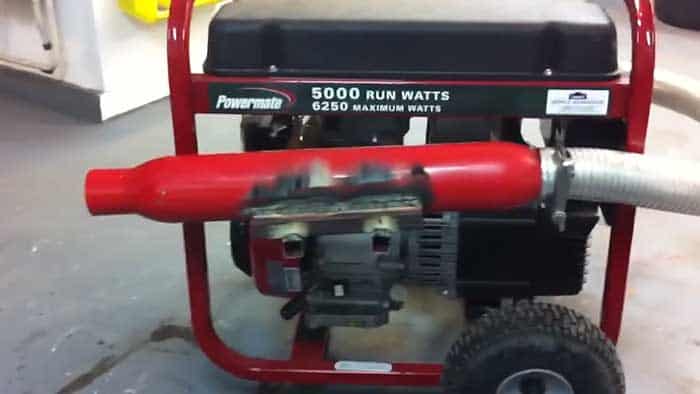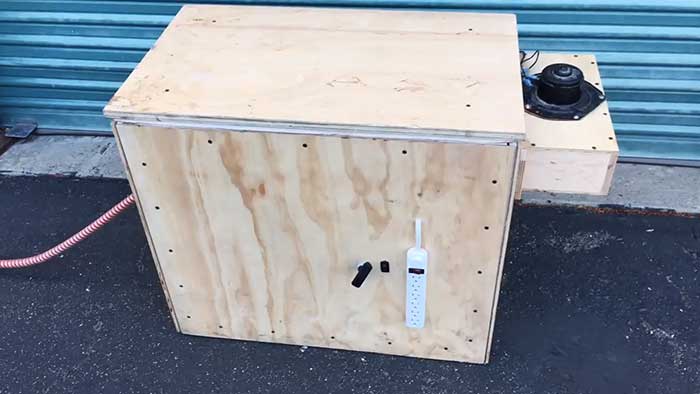Last Updated on May 3, 2023 by Rod Olivares

Portable generators are a great tool to have for mobile power, blackouts, and RVs.
However, they can generate a lot of noise, which can prove to be a nuisance in rural areas or close quarters.
If you are like me, you want to be able to keep your noise pollution from your generator down as much as possible.
That is where a portable generator silencer or muffler comes in!
A silencer or muffler attaches to the exhaust pipe on your generator and helps to suppress the noise that the generator produces.
There are many ways to reduce your generator’s noise level, and in this post, I am going to show you what works.
How Loud Are Generators?
You know as well as I do that portable generators are loud, but how loud are they?
Most portable generators have a noise level or 70-100 decibels at 23 feet (industry-standard measuring).
Noise levels will vary depending on which make, model, and size you choose to go with – see this post about the quietest brands and models.
From my experience, if you choose to spend a little more money upfront, you can get a quieter model that will require less sound muffling than cheaper models.
However, I understand that an expensive generator is not in everyone’s budget, so knowing how to quiet down a louder generator may be helpful.
Why Should I Silence My Generator?
Silencing or muffling your generator not only helps keep you from being bothered by a constantly loud motor, but it is also a generous act for others around you.Using a generator in a neighborhood setting can annoy your neighbors, but showing that you are at least trying to keep the sound down will go a long way toward mutual understanding.
For those using a generator in the winter months where snow is prevalent, keeping your generator near your home or in your garage may be necessary.
This can amplify the sound greatly; keeping it muffled can really help out.
For whatever reason you may need to muffle your generator, I am going to provide you with my top tips on how to do it.
Can I Use an Automotive Muffler Silence My Generator?

Yes, you read that right: you can use an automotive muffler to muffle the sound of your portable generator.
While this is not the most straightforward method when done correctly, it can achieve a 10-15 decibel reduction. All you will need is an automotive muffler, some creativity, and a few tools.
Now when I say done correctly, I am referring to those who have bent, welded, and mounted the correct piping and adapters for a leak-free exhaust.
This process requires a great deal of skill.
You can still achieve a reduction in noise levels by simply bolting the muffler on with some clamps and exhaust flex tubing; however, it is not as effective as welding the correct piping together.
I will say that the type of muffler that you choose will influence your success in silencing your generator.
You will want to do a little research on specific muffler specs and sizes to ensure you get one that will adequately muffle and will fit on your generator without being intrusive.
Using a Generator Muffler Silencer
The most popular way to correctly muffle your generator’s exhaust is with a generator muffler silencer.
These silencers mount to your portable generator’s exhaust and act as a silencer to reduce noise levels by 10-15 decibels.
They can be bought or made at home; however, make sure you have a decent amount of knowledge on how mufflers and silencers work to allow for adequate exhaust flow.
Muffling Sound with Plywood Boards
One of the quickest and most inexpensive ways to reduce your generator’s decibel levels is by muffling the sounds with plywood.
By placing durable plywood around the generator, you can lower the noise level at least 10 decibels, which will make it much more bearable in a neighborhood setting.
To do this, you will need some plywood scraps that are large enough to extend past your generator.
You will then lay them against your generator in a box shape to deflect the generator’s noise to the ground.
This allows for the sound to be contained and absorbed by the ground instead of toward your surroundings.
Building a Silencer Box

If you want a more comprehensive solution, you can build a silencer box that installs over your generator to muffle the noise, similar to the plywood method.
Building a silencer box will take a bit of woodworking, but it provides an easy way to muffle the sound of your generator quickly and even on the go.
To do this, you will need to build a wooden frame that fits over your portable generator and attach plywood, foam backing, or any other sturdy material suitable for building that will muffle the sound.
Building an inner and outer box on your frame and filling it with insulation will reduce noise while keeping the box lightweight and effective.
A few things to remember are:
- Add a handle for easy handling
- Ensure there is adequate air flow to reduce the chances of overheating
- Add a cutout for an exhaust extension to allow your generator’s exhaust to flow properly
These steps will significantly reduce the chances of your generator overheating from inadequate airflow.
I have seen a few boxes with built-in fans that helped cool the generator while it was running, so the possibilities are endless.
5 Tips for Keeping Noise Levels Down
While all of these methods above will help drastically improve your generator’s noise level, there are a few simple tips that you can follow to reduce noise pollution.
1. Install Your Generator Away from Your Home
While this seems like a no-brainer, it is an often-overlooked factor when using a portable generator.
Most generators produce 70-80 decibels at 23 feet, which could be more than you want to hear inside your home.
By moving your generator further away from your home and utilizing longer extension cords can easily cut down on how much noise you hear from your portable generator.
2. Keep the Exhaust Facing Away from Your Home
If moving your generator further from your home is not an option, there are still ways to keep the noise level down.
One simple trick is to have the exhaust, the primary source of noise, pointed away from your home.
Sound waves travel, and having them move in a direction away from your home can make a huge difference compared to having the exhaust pointed at your home.
Add one of the tips from above and get double the sound reduction!
See my post on how to extend a generator exhaust
3. Deflect the Sound as Much as Possible
Similar to the plywood method of deflecting sound, using your surroundings to help deflect the sound can be a huge help.
Moving items near your generator in front of or around your generator can help deflect the sound.
One of our favorite ways is to mount it behind a shed or other solid objects that will help absorb sound.
4. Install the Generator on a Sturdy, Sound-Absorbing Floor
The last thing you want to do when setting up your portable generator is to make it louder by installing it on a sound-amplifying floor.
Running your generator on a concrete or wooden floor can make your generator sound louder than usual.
I suggest adding a sound-absorbing mat to where your generator will be mounted in the form of a heavy-duty shop mat to help reduce unnecessary noise.
5. Invest in a High-Quality Generator with Low Noise Volumes
If your budget allows for it, the easiest way to keep noise levels down with your generator is by investing in a high-quality generator with a low noise output.
While this is not an option for everyone, it is my best suggestion to have a quiet generator that requires no extra work to muffle sound. The Honda EU2200i is the gold standard for quiet generators that don’t require a muffler.
In Conclusion
Taking all of these suggestions into consideration, you can easily quiet your portable generator with any budget.
The main thing to consider is how much time and energy you want to put into your muffler solution.
As of now, there is no reliable solution to silence your generator completely, but reducing it by 10-15 decibels can make a surprisingly big difference that your neighbors will surely appreciate.
With all of these solutions, please use extreme caution on proper ventilation and adequate airflow to protect both you and your generator.
We want to hear from you! In what ways have you effectively muffled or silenced your generator?
What products have worked and not worked for your generator?

Scott Krager purchased generatorgrid.com in the summer of 2020 and quickly began to buy every generator under the sun! He currently has over a dozen generators and the number is growing quickly. He lives in Portland, OR near his family and friends.
GeneratorGrid.com is an independent review business. I am not affiliated with any manufacturers and do not accept paid reviews. When you buy through my links, I may earn a commission which helps me purchase more generators for testing. - Scott Krager


Hi how are you? nice post. I have some question… i need to buy a Champions 12000 Watts for my food truck and I think (78 dB). So the question is if this whole system muffler+silencer+zoombie box could help me to decrease the noise
Thanks
I have a Cummins stand by generator that runs at 3600 RPMs. It’s mounted on a slab. Any ideas to reduce the noise other than building a wall?
Many Thanks – Ed
It seems the noise from my XG-SF600 (500W, real Sinus, 4 stroke, ~20 pounds, ~9Kg, official ~58dB, similar to Honda “EU10i” but smaller) does not come from the small muffler.
With a water hose on muffler output, and outside the door, the noise is not lower.
Do you have any advice what I could do?
A complete box of 2.5cm thick compressed wood and inside bitumen tiles and 3cm sound absorbing foam (I have bitumen with foam on it)?
But the air supply.
Every hole for a fan is an exit for noise.
Should I put an old automobile exhaust in the wood case? But then I have to press or suck the air through the exhaust.
And the openings on an exhaust are very small.
One fan has 8cm, 12cm, 15cm (I have two old 35W-230V ~ 6-inch, ~ 15cm fans from Pabst).
Do not I need two mufflers? One for the air outlet, and one for the air intake?
I spoke to a generator specialist and he said that a box, even well ventilated, will dramatically shorten the gens life due to the high temp and recirculating emmisions. What do yo guys here think?
I’m on the fence on this, if you use passive ventilation you might not get rid of all the heat, but if you have active ventilation in the form of a fan you shouldn’t have any issues at all, infact you can more then likely run the generator cooler if you do it correctly, and you can also incorporate air intake filters using a MERV10 or higher furnace filter and you’ll keep everything cleaner which will also help increase the life of your generator, but again there is a cost to doing this, adding a fan adds a load to the generator which is fuel, but if it’s done correctly they can be very nice and quite and keep your unit out of the elements and dry.
I think that all the ideas are great and just shows I’m not the only creative person with this problem of generator sound. I am going to build an insulated box by sandwiching both plywood and foam set about 12” in ground on concrete pad with shop mat beneath adding a lock down system for theft finishing with a silencer or muffler and a 12” automotive fan with a 12 volt battery and a solar charging system to keep battery charged and generator cool Maintenance is to use an extractor to change oil The entire cost with generator is $873.00
I like your idea, but those automotive fans use several amps while running and will kill the battery fairly quickly, If I was to do what your doing I would also grab a small HP server power supply like a DPS800-GB ( they are like $20 on ebay ) and use this to charge the battery from the generator while it’s running or at least to maintain the fan, they are small power supplies they run on any voltage between 100 and 240 VAC 47 Hz to 63 Hz they don’t care if your not using a newer inverter generator and they will output about 80 Amps at 12 volts, a quick google search will show you how to make them work, and some of the radio amatures will even tell you how to increase the output voltage to 13.6 to 14.1 DC to use them as very nice battery chargers on the cheap. I have two of them and they are the size of a 1 quart milk carton and only weight like 2 maybe 3 lbs and they will recharge a group 21 in about an hour and will keep your fan moving all night long.
If you are really serious about quietening a home based generator, a very large and very heavy home built muffler can reduce exhaust noise to practically zero. This is totally impractical for a portable generator, but for a fixed “home” generator its well worth the effort.
The only way to fully attenuate the explosive exhaust pops is to feed them into a very large expansion chamber, where the volume is at least many hundreds of times the capacity of one engine cylinder. That sounds a lot, but its actually very easy to achieve.
A second requirement is that the walls of this expansion chamber are totally sound proof. And the only way to do that is with a steel pressure vessel that has very heavy and very thick walls.` A paint tin or oil drum is simply not going to work. A large propane tank would be very marginal, but better than nothing. The ideal thing is the pressure storage receiver salvaged from a junked large air compressor.
These can have steel typically 3/8 inch thick, and can weigh 100lbs to 200 lbs. It will also have a (required by law) removable inspection cover.
Third requirement is to stuff as much fiberglass insulation or rock wool inside as you can possibly cram in there, through the inspection cover.
There will be at least one large threaded boss on the pressure vessel that can be plumbed directly to the pipe thread on the cylinder head of the engine with standard galvanized water pipe, and fittings.
The final secret is to place a restricted outlet from the pressure vessel. There will be a constant non pulsing flow, and in fact it will just quietly hiss if its made very small. But something in the range of a half inch to three quarter inch diameter exit diameter might be about right. You can put your ear right up to that and hear almost nothing.
The vibrating engine itself will be the only noise source, and air cooled engines can rattle a fair bit. Induction noise may also be significant, but its still going to be very quiet.
The whole thing is going to be laughably enormous, heavy, and ugly. And just totally impractical for anything other than a permanent fixed installation. But I think you are going to be extremely pleased with the final result.
The exhaust pops echo around inside the chamber and are totally absorbed by the rock wool. The acoustic energy is all converted to heat. Pressure fluctuations diminish to almost zero because the chamber volume is huge compared to the volume of gas in each exhaust pop. Outlet exhaust flow will be continuous, the pulsing is so low its inaudible. Provided the chamber is rigid enough no sound can escape through the very thick heavy walls.